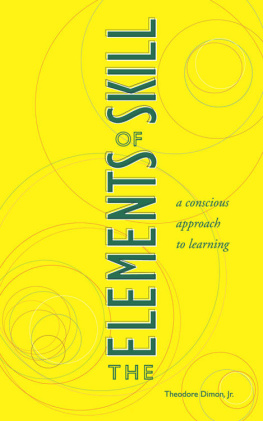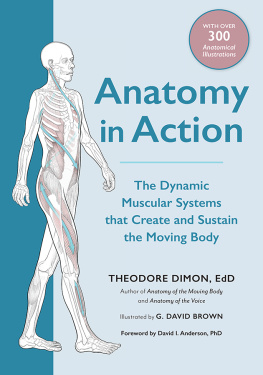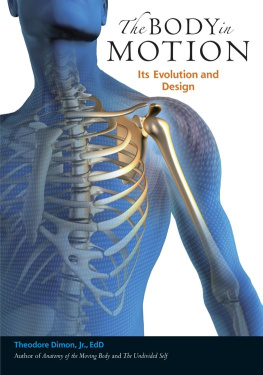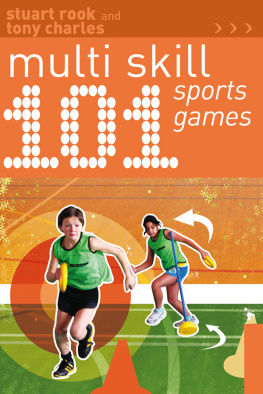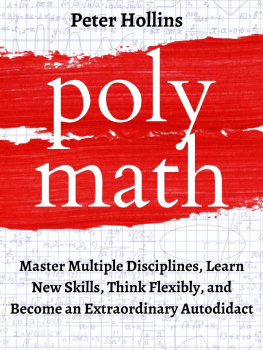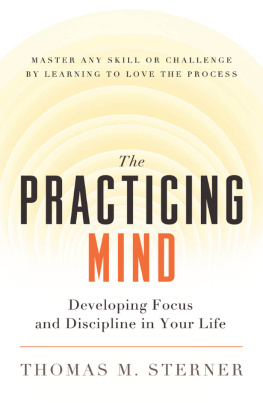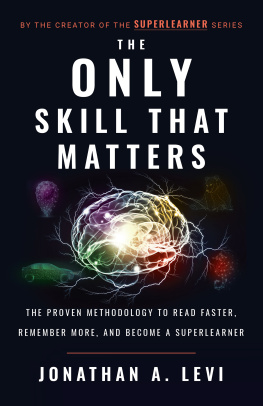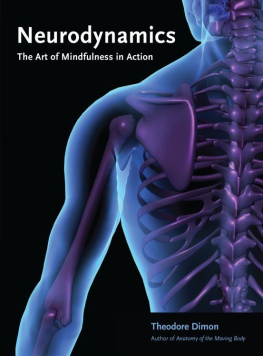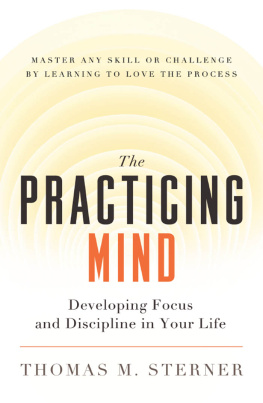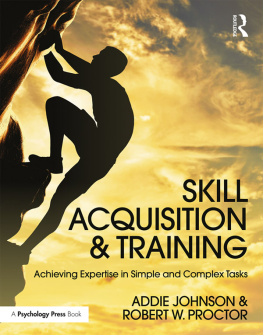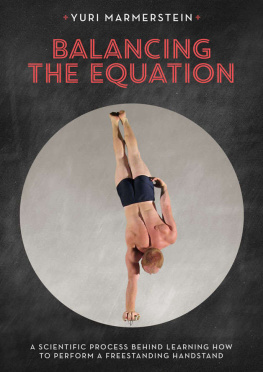Other Books by Theodore Dimon,
published by North Atlantic Books
Anatomy of the Moving Body, Second Edition: A Basic Course in Bones, Muscles, and Joints. A basic course in bones, muscles and joints for teachers and students specializing in movement.
The Body in Motion: Its Evolution and Design. An original look at the body in activity for healthcare professionals, dancers, actors, movement educators, therapists, and students and teachers of yoga.
Your Body, Your Voice: The Key to Natural Singing and Speaking. A new approach to the voice that provides the foundation for learning natural and effortless vocal production through a complete understanding of how the vocal mechanism works.
The Undivided Self: Alexander Technique and the Control of Stress. A study of stress based on the awareness of human behavior patterns.
Copyright 2003 by Theodore Dimon, Jr. All rights reserved. No portion of this book, except for brief review, may be reproduced, stored in a retrieval system, or transmitted in any form or by any meanselectronic, mechanical, photocopying, recording, or otherwisewithout the written permission of the publisher. For information contact North Atlantic Books.
Published by:
North Atlantic Books
P.O. Box 12327
Berkeley, California 94712
Cover Design by Nancy Cowen, Cowen Design
The Elements of Skill is sponsored by the Society for the Study of Native Arts and Sciences, a nonprofit educational corporation whose goals are to develop an educational and cross-cultural perspective linking various scientific, social, and artistic fields; to nurture a holistic view of arts, sciences, humanities, and healing; and to publish and distribute literature on the relationship of mind, body, and nature.
North Atlantic Books publications are available through most bookstores. For further information, visit our website at www.northatlanticbooks.com or call 800-733-3000.
The Library of Congress has cataloged the printed edition as follows:
Dimon, Theodore.
The elements of skill : a conscious approach to learning / by Theodore Dimon, Jr.
p. cm.
Includes bibliographical references.
eISBN: 978-1-58394-703-6
1. Learning ability. 2. Learning, Psychology of. I. Title.
LB1134.D56 2003
370.1523dc22
2003016492
v3.1
For my mother, Themis Dimon, who through her patience and understanding taught me what it means to be a teacher

CHAPTER ONE
Learning How To Learn
CHAPTER TWO
The Elements of Skill
CHAPTER THREE
Tension in Performance
CHAPTER FOUR
Tension and Performance Anxiety
CHAPTER FIVE
The Role of Reaction in Skilled Performance
CHAPTER SIX
The Role of Habit in Skilled Performance
1. Defective Action and Its Role
in Skilled Performance
CHAPTER SEVEN
Non-Doing in Action
CHAPTER EIGHT
High-Level Skills and the Art of Non-Doing
T his book has been a long time in the making, and the help I have received in the process of writing it spans a period of twenty years. First of all I would like to thank Professor Vernon Howard, my graduate school advisor at Harvard University, who gave me a great deal of encouragement when I truly needed it. Thanks also to Professors Israel Scheffler and David Perkins at Harvard for supporting the doctoral work that led to this book.
I would like to thank my partner Elizabeth Drakeley for her support, criticism, and intelligent insight into my writing. She understood the vision behind this book even when I had doubts, and she saw, when I could not, how the book needed to be reworked and thus cleared the way for me to finish the manuscript when it was still languishing on the shelf.
I would like to express my gratitude to Walter Carrington, my teacher and mentor, whose practical knowledge and teaching wisdom helped me to arrive at many of the insights expressed in this book.
Thanks also to Dan Marcus, my friend and colleague, for his insightful comments and edits on the most difficult chapters.
Thanks are also due to Dena Davis for her constant support as well as practical advice and proofreading; to Jay Kramer, my lawyer and agent; to Richard Grossinger and North Atlantic Books; to Sarah Serafimidis, who was so helpful in taking the book through the various phases of production; to Kathy Glass, editor at North Atlantic; to Jan Camp for the layout and design; to David Day for his assistance with the photos; and to Nancy Cowen for the cover design.
I would like to express my gratitude to my grandparents, Panos and Theonia Dimon; my father, Theodore Dimon, Sr., and my mother, Themis Dimon, to whom this book is dedicated.
Finally, I would like to thank Dr. Seymour Simmons, my good friend and colleague, with whom I have shared many hours of discussion and debate throughout graduate school and beyond, and whose continuing friendship and support have played so instrumental a part in my development.
B uilding on the work of John Dewey and F. Matthias Alexander, Theodore Dimon, Jr. has given us a blueprint for learning that is both attractive and accessible. The Elements of Skill locates learning neither in the mind nor in the body, as many philosophers, psychologists, and educational theorists have tended to do, but in the organism as a whole as it interacts with its environing conditions.
Like Dewey and Alexander, Dimon avoids rote exercises and drills, thus rejecting what he correctly describes as the false dichotomy between technical skill and bodily coordination. Like Dewey and Alexander, he emphasizes informed and intelligent efforts to balance the respective roles of means and ends within the learning process. He recognizes that ends-in-view must be neither inflexible nor vague, and that the means to those ends must undergo continual re-adjustment in the light of emerging conditions. And like Dewey and Alexander, Dimon is not focused on how particular skills are learned. He wants to teach us how we can learn to learn. Dimons challenge to learning is thus primarily forward-looking and preventive in nature, rather than simply curative and remedial. He is concerned with fundamental changes rather than the treatment of symptoms. His approach to learning delivers a challenge. It demands the expenditure of intellectual and moral energy rather than promising cheap and easy results. The potential rewards of applying the lessons of The Elements of Skill are considerable: enhanced appreciation of the role of experiment in learning; new perspectives on problem-solving; and a greater measure of self-control. As Dimon demonstrates, these rewards are available to all of us.
Larry A. Hickman, Director, The Center for Dewey Studies, Southern Illinois University, Carbondale
Next page
